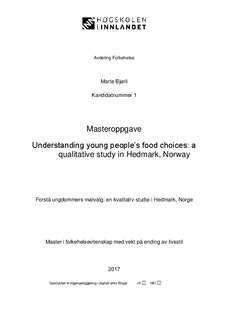Understanding young people’s food choices: a qualitative study in Hedmark, Norway
Master thesis

Åpne
Permanent lenke
http://hdl.handle.net/11250/2449769Utgivelsesdato
2017Metadata
Vis full innførselSammendrag
The aim: to develop an in-depth understanding of Norwegian upper high school students’ perceptions of the influences on their food choices, not only in school but in their everyday life. In addition the aim is to understand how food choices and patterns of eating change as young people move from childhood towards young adulthood.
Theory: The theoretical framework was based on a socio-ecological model. In addition, the sociological concepts “habitus”, “socialization” and “transition” were used. Methods: This was a qualitative study, involving four focus groups. Sixteen participants from various education programs (health and youth development, building trades, sports and general subjects) from a high school in Hedmark in Norway through purposive sampling were recruited. The participants were aged between16-18: half of them were girls and the other half were boys. Data collection was conducted in spring 2017. An inductive thematic analysis indentified four themes and nine sub-themes which highlighted the influence on and the development of young people’s food choices.
Findings: The research identified the following influences on food choices: food preferences, time, knowledge and access, alongside social influences such as parents as role models, participation in food-related decisions, social media and eating as a social activity. A gender pattern was identified among all the social influences on young people’s food choice. As the young people grew older (that is to say, as they made the transition through youth) they tended to make less healthy food choices. At the same time, knowledge and access increased in line with young people’s increased independence and decreased parental control, and gender differences in influences through social media, body image and expectations appeared giving rise to differences in food choices between boys and girls.
Conclusion: The findings of this study support earlier studies in that there are differences in influences on young people’s choices from childhood towards young adulthood. However, it adds another deeper layer in understanding food choices in young people by showing the importance of social influences across food choices, highlighting the importance of early development of young people’s food choices within the family and later, eating as an identity and social activity with friends. This study suggests that young people’s diet becomes more unhealthy as they move through youth by social experimentation and “risk” behaviour, increased independence in general (also in food choices) and changes in the environment. It may be a period of unhealthy eating which shifts when young people become more established as an adult. Longitudinal studies could help in understanding this. Also, this study confirmed that food choices are not necessarily – if at all – influenced by knowledge of healthy foods, particularly during youth. The findings in this study, suggest offering healthy food at a reasonable price which is quick to make and in addition, reducing unhealthy food in the areas where young people spend much of their time, seem effective in modifying adolescent’s food choices. Formål: Denne studien ønsker å utvikle en grundig forståelse av norske videregående elevers oppfatninger av påvirkninger på deres matvalg i hverdagen. I tillegg vil studien prøve å forstå hvordan matvalg og matmønstre endres etter hvert som ungdommene utvikler seg mot voksenlivet.
Teori: Studiens teoretiske rammeverk tar utgangspunktet i den sosial økologiske modellen. I tillegg blir de sosiologiske konseptene ”habitus”, ”socialization” og ”transition” brukt.
Metode: Dette er en kvalitativ studie med fire fokusgrupper. Seksten deltakere fra ulike utdanningsprogrammer (helse- og oppvekstfag, byggfag, idrettsfag og studiespesialisering) fra en videregående skole i Hedmark i Norge ble rekruttert gjennom purposive sampling. Deltakerne var mellom 16-18 år: halvparten av dem var jenter og den andre halvparten var gutter. Datainnsamling ble gjennomført i løpet av våren 2017. En induktiv tematisk analyse identifiserte fire temaer og ni subtemaer som fremhevede påvirkninger og utviklingen av ungdommens matvalg.
Funn: Studien identifiserte følgende påvirkninger på matvalg: matpreferanser, tid, kunnskap og tilgang, sammen med sosiale påvirkninger som foreldre som rollemodeller, deltakelse i matrelaterte beslutninger, sosiale medier og spising som en sosial aktivitet. Et kjønnsmønster ble identifisert blant alle de sosiale innflytelsene på ungdommens matvalg. Etter hvert som ungdommene ble eldre (det vil si, går igjennom "translation” fra ungdomslivet mot voksenlivet), hadde de en tendens til å ta mindre sunne matvalg. samtidig økte kunnskapen og tilgangen i tråd med ungdommens økt uavhengighet og redusert foreldrekontroll, og kjønnsforskjeller i påvirkning fra sosiale medier, kroppsbilde og forventninger dukket opp, som medførte forskjeller i matvalg mellom gutter og jenter.
Konklusjon: Resultatene fra denne studien støtter tidligere funn ved at det er forskjeller i påvirkning av unges matvalg fra barndommen til ungt voksenliv. Den legger imidlertid til et dypere lag i forståelsen av unges matvalg ved å vise betydningen av sosiale påvirkninger på tvers av matvalgene. Studien understreker samtidig viktigheten av tidlig utvikling av ungdommens matvalg i familien, og senere, at å spise omhandler identitet og er en sosial aktivitet unge gjør, gjerne med venner. Denne studien antyder at ungdommer tar flere usunne kostholdsvalg når de beveger seg gjennom ungdomstiden ved sosial eksperimentering og "risikooppførsel”, økt uavhengighet generelt (også i matvalg) og endringer i miljøet. Det kan også være slik at ungdomstiden er en usunn periode, som endres når ungdom blir mer etablert. Langtidsstudier kan bidra til å forstå dette. Denne studien bekreftet også at matvalg ikke nødvendigvis - om i det hele tatt - påvirkes av kunnskap om å ta sunne matvalg, særlig under ungdomstiden. Funnene i denne studien foreslår at å tilby sunn mat til en fornuftig pris som er rask å lage, og i tillegg reduserer usunn mat i områdene hvor ungdommer bruker mye av sin tid, virker effektivt for å endre ungdommens matvalg.
Beskrivelse
Master i folkehelsevitenskap med vekt på endringer av livsstilsvaner, 2017